Psychosocial Development in Nursing: Erikson's Stages and Case Study
VerifiedAdded on 2022/10/14
|6
|1733
|358
Essay
AI Summary
This nursing assignment delves into the concept of psychosocial development, particularly within the framework of Erikson's stages. It begins by exploring the psychosocial development of children, focusing on the second stage, autonomy vs. shame and doubt, and applying it to a case study of a 2.5-year-old boy named Andrew. The essay then examines the influence of physical development, like communication and activity, on psychosocial development, underscoring how these factors contribute to a child's sense of self and independence. Furthermore, the assignment investigates different parenting styles—authoritarian, authoritative, permissive, and uninvolved—and their respective impacts on a child's psychosocial growth. The conclusion emphasizes the importance of proper toilet training, physical activity, and authoritative parenting in fostering healthy psychosocial development, as per Erikson's model, ultimately promoting children's mental and emotional well-being. The essay also highlights how the development of verbal communication skills and group activities can help children to achieve their sense of autonomy.
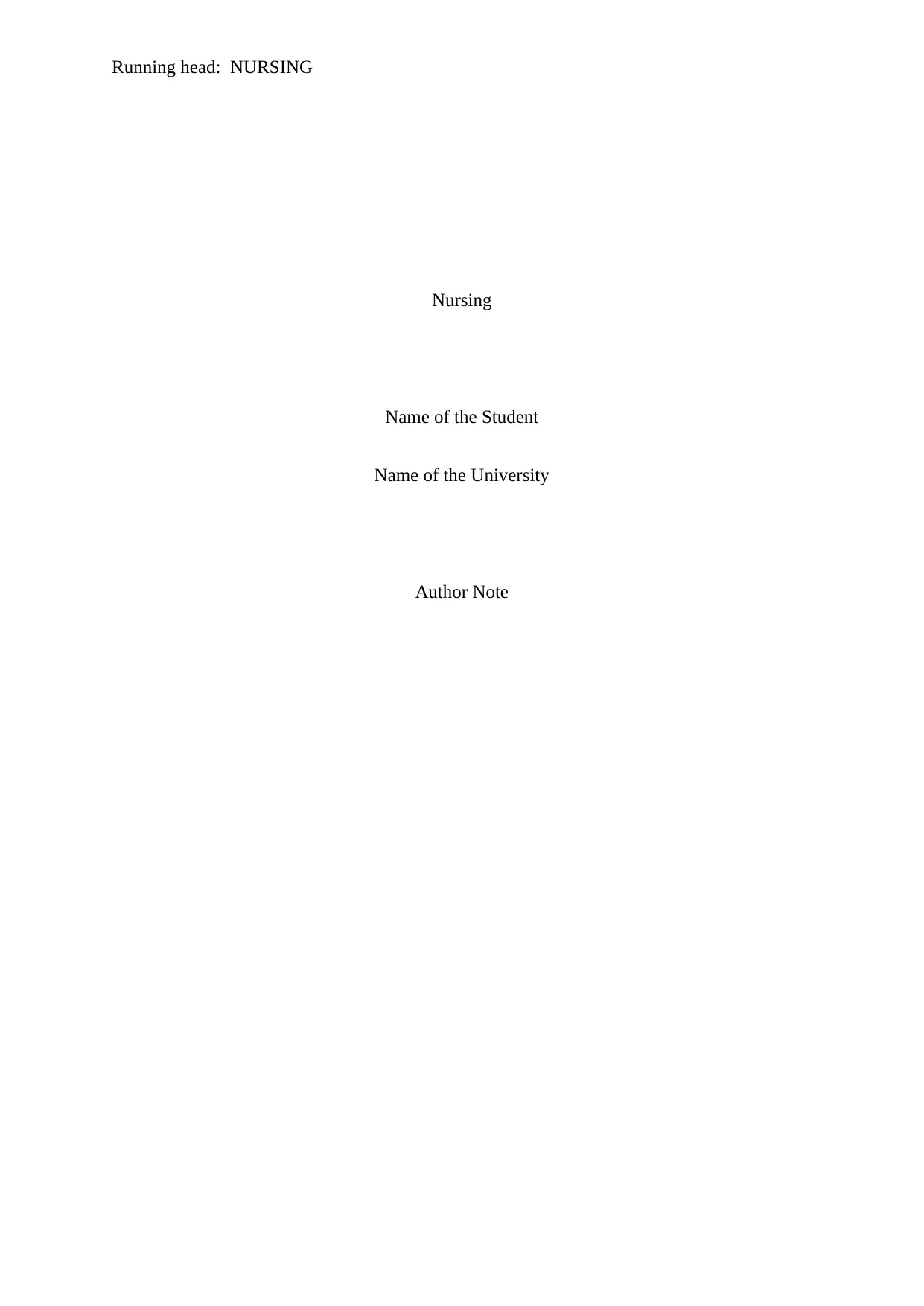
Running head: NURSING
Nursing
Name of the Student
Name of the University
Author Note
Nursing
Name of the Student
Name of the University
Author Note
Paraphrase This Document
Need a fresh take? Get an instant paraphrase of this document with our AI Paraphraser
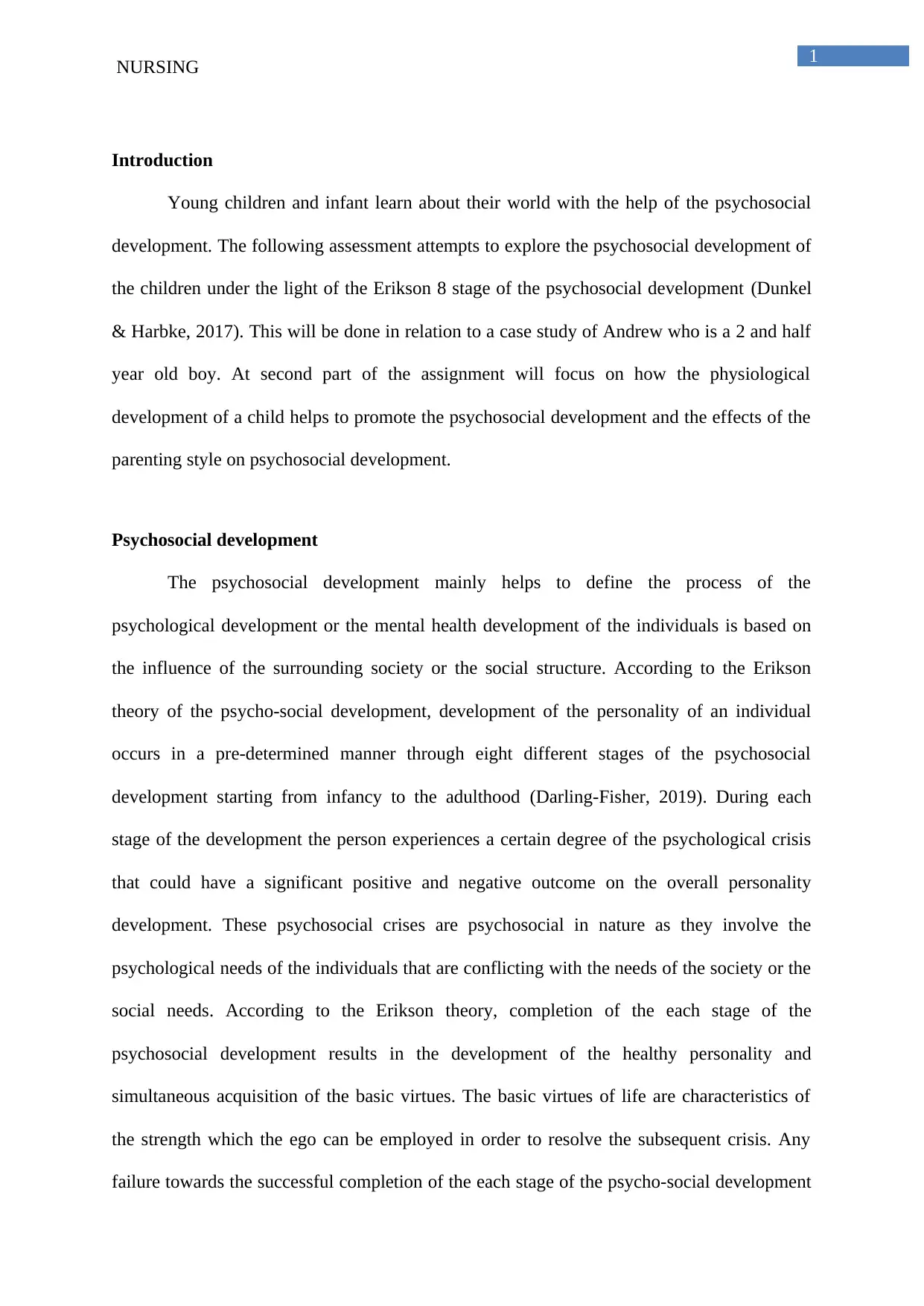
1
NURSING
Introduction
Young children and infant learn about their world with the help of the psychosocial
development. The following assessment attempts to explore the psychosocial development of
the children under the light of the Erikson 8 stage of the psychosocial development (Dunkel
& Harbke, 2017). This will be done in relation to a case study of Andrew who is a 2 and half
year old boy. At second part of the assignment will focus on how the physiological
development of a child helps to promote the psychosocial development and the effects of the
parenting style on psychosocial development.
Psychosocial development
The psychosocial development mainly helps to define the process of the
psychological development or the mental health development of the individuals is based on
the influence of the surrounding society or the social structure. According to the Erikson
theory of the psycho-social development, development of the personality of an individual
occurs in a pre-determined manner through eight different stages of the psychosocial
development starting from infancy to the adulthood (Darling-Fisher, 2019). During each
stage of the development the person experiences a certain degree of the psychological crisis
that could have a significant positive and negative outcome on the overall personality
development. These psychosocial crises are psychosocial in nature as they involve the
psychological needs of the individuals that are conflicting with the needs of the society or the
social needs. According to the Erikson theory, completion of the each stage of the
psychosocial development results in the development of the healthy personality and
simultaneous acquisition of the basic virtues. The basic virtues of life are characteristics of
the strength which the ego can be employed in order to resolve the subsequent crisis. Any
failure towards the successful completion of the each stage of the psycho-social development
NURSING
Introduction
Young children and infant learn about their world with the help of the psychosocial
development. The following assessment attempts to explore the psychosocial development of
the children under the light of the Erikson 8 stage of the psychosocial development (Dunkel
& Harbke, 2017). This will be done in relation to a case study of Andrew who is a 2 and half
year old boy. At second part of the assignment will focus on how the physiological
development of a child helps to promote the psychosocial development and the effects of the
parenting style on psychosocial development.
Psychosocial development
The psychosocial development mainly helps to define the process of the
psychological development or the mental health development of the individuals is based on
the influence of the surrounding society or the social structure. According to the Erikson
theory of the psycho-social development, development of the personality of an individual
occurs in a pre-determined manner through eight different stages of the psychosocial
development starting from infancy to the adulthood (Darling-Fisher, 2019). During each
stage of the development the person experiences a certain degree of the psychological crisis
that could have a significant positive and negative outcome on the overall personality
development. These psychosocial crises are psychosocial in nature as they involve the
psychological needs of the individuals that are conflicting with the needs of the society or the
social needs. According to the Erikson theory, completion of the each stage of the
psychosocial development results in the development of the healthy personality and
simultaneous acquisition of the basic virtues. The basic virtues of life are characteristics of
the strength which the ego can be employed in order to resolve the subsequent crisis. Any
failure towards the successful completion of the each stage of the psycho-social development
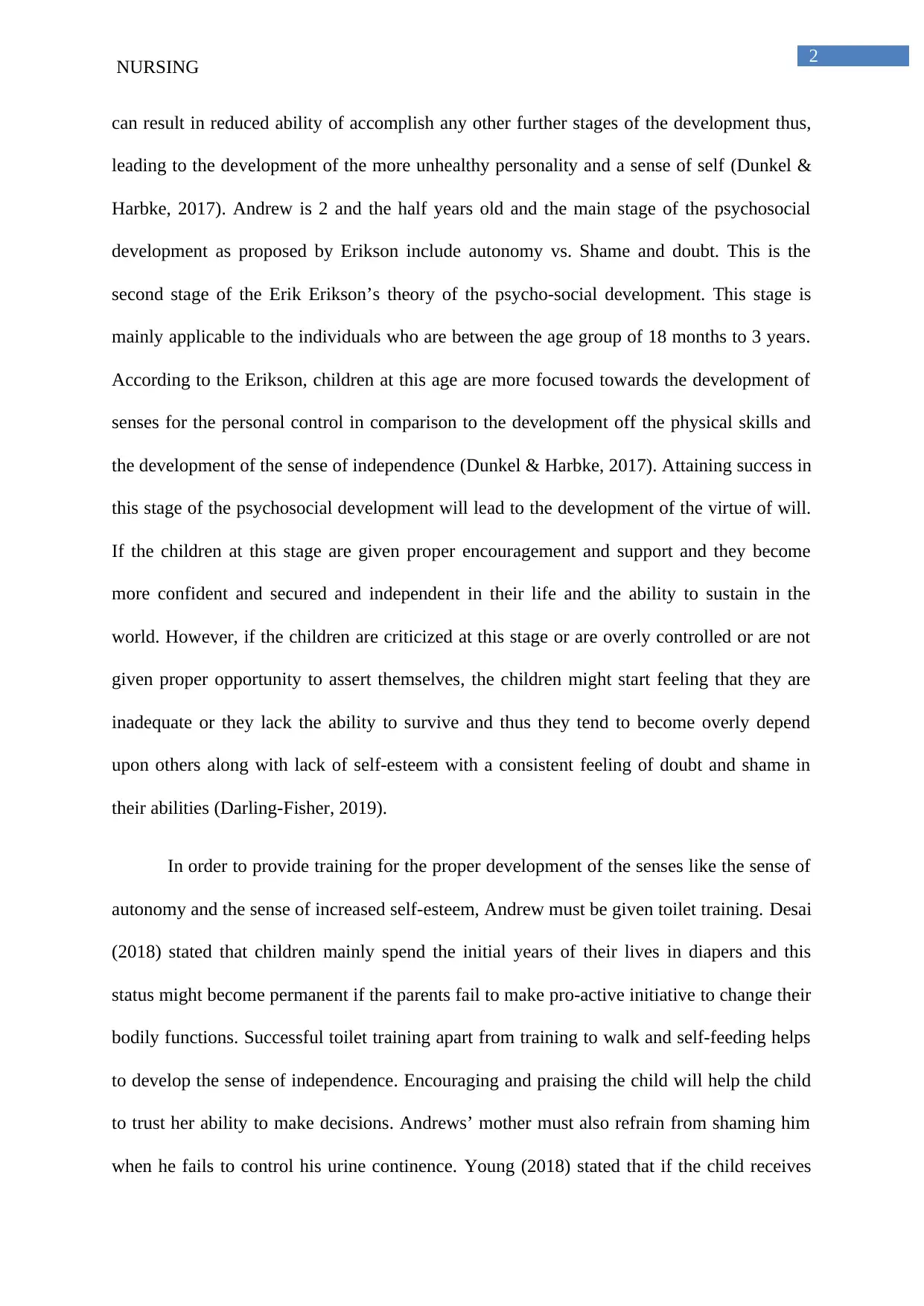
2
NURSING
can result in reduced ability of accomplish any other further stages of the development thus,
leading to the development of the more unhealthy personality and a sense of self (Dunkel &
Harbke, 2017). Andrew is 2 and the half years old and the main stage of the psychosocial
development as proposed by Erikson include autonomy vs. Shame and doubt. This is the
second stage of the Erik Erikson’s theory of the psycho-social development. This stage is
mainly applicable to the individuals who are between the age group of 18 months to 3 years.
According to the Erikson, children at this age are more focused towards the development of
senses for the personal control in comparison to the development off the physical skills and
the development of the sense of independence (Dunkel & Harbke, 2017). Attaining success in
this stage of the psychosocial development will lead to the development of the virtue of will.
If the children at this stage are given proper encouragement and support and they become
more confident and secured and independent in their life and the ability to sustain in the
world. However, if the children are criticized at this stage or are overly controlled or are not
given proper opportunity to assert themselves, the children might start feeling that they are
inadequate or they lack the ability to survive and thus they tend to become overly depend
upon others along with lack of self-esteem with a consistent feeling of doubt and shame in
their abilities (Darling-Fisher, 2019).
In order to provide training for the proper development of the senses like the sense of
autonomy and the sense of increased self-esteem, Andrew must be given toilet training. Desai
(2018) stated that children mainly spend the initial years of their lives in diapers and this
status might become permanent if the parents fail to make pro-active initiative to change their
bodily functions. Successful toilet training apart from training to walk and self-feeding helps
to develop the sense of independence. Encouraging and praising the child will help the child
to trust her ability to make decisions. Andrews’ mother must also refrain from shaming him
when he fails to control his urine continence. Young (2018) stated that if the child receives
NURSING
can result in reduced ability of accomplish any other further stages of the development thus,
leading to the development of the more unhealthy personality and a sense of self (Dunkel &
Harbke, 2017). Andrew is 2 and the half years old and the main stage of the psychosocial
development as proposed by Erikson include autonomy vs. Shame and doubt. This is the
second stage of the Erik Erikson’s theory of the psycho-social development. This stage is
mainly applicable to the individuals who are between the age group of 18 months to 3 years.
According to the Erikson, children at this age are more focused towards the development of
senses for the personal control in comparison to the development off the physical skills and
the development of the sense of independence (Dunkel & Harbke, 2017). Attaining success in
this stage of the psychosocial development will lead to the development of the virtue of will.
If the children at this stage are given proper encouragement and support and they become
more confident and secured and independent in their life and the ability to sustain in the
world. However, if the children are criticized at this stage or are overly controlled or are not
given proper opportunity to assert themselves, the children might start feeling that they are
inadequate or they lack the ability to survive and thus they tend to become overly depend
upon others along with lack of self-esteem with a consistent feeling of doubt and shame in
their abilities (Darling-Fisher, 2019).
In order to provide training for the proper development of the senses like the sense of
autonomy and the sense of increased self-esteem, Andrew must be given toilet training. Desai
(2018) stated that children mainly spend the initial years of their lives in diapers and this
status might become permanent if the parents fail to make pro-active initiative to change their
bodily functions. Successful toilet training apart from training to walk and self-feeding helps
to develop the sense of independence. Encouraging and praising the child will help the child
to trust her ability to make decisions. Andrews’ mother must also refrain from shaming him
when he fails to control his urine continence. Young (2018) stated that if the child receives
⊘ This is a preview!⊘
Do you want full access?
Subscribe today to unlock all pages.

Trusted by 1+ million students worldwide
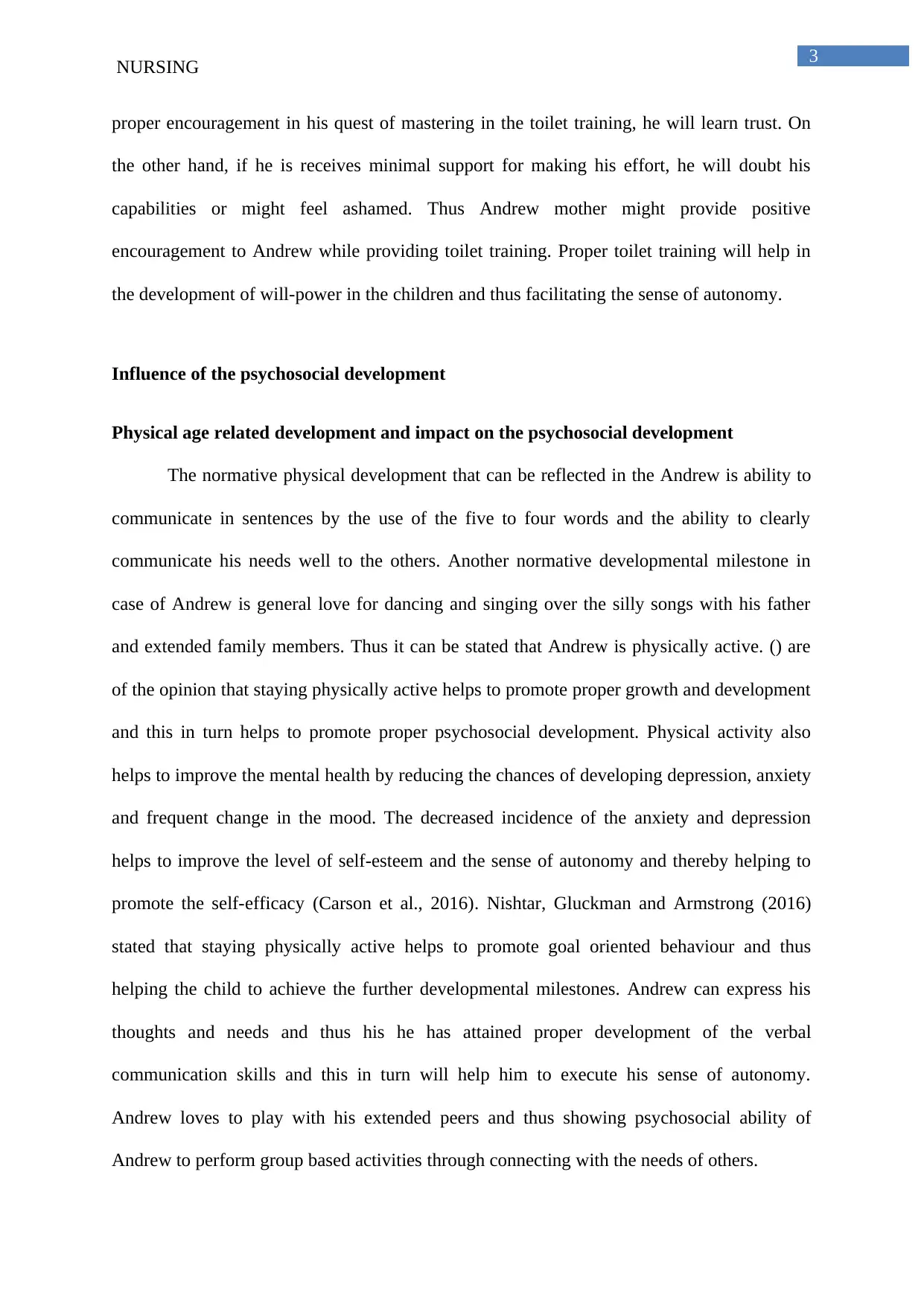
3
NURSING
proper encouragement in his quest of mastering in the toilet training, he will learn trust. On
the other hand, if he is receives minimal support for making his effort, he will doubt his
capabilities or might feel ashamed. Thus Andrew mother might provide positive
encouragement to Andrew while providing toilet training. Proper toilet training will help in
the development of will-power in the children and thus facilitating the sense of autonomy.
Influence of the psychosocial development
Physical age related development and impact on the psychosocial development
The normative physical development that can be reflected in the Andrew is ability to
communicate in sentences by the use of the five to four words and the ability to clearly
communicate his needs well to the others. Another normative developmental milestone in
case of Andrew is general love for dancing and singing over the silly songs with his father
and extended family members. Thus it can be stated that Andrew is physically active. () are
of the opinion that staying physically active helps to promote proper growth and development
and this in turn helps to promote proper psychosocial development. Physical activity also
helps to improve the mental health by reducing the chances of developing depression, anxiety
and frequent change in the mood. The decreased incidence of the anxiety and depression
helps to improve the level of self-esteem and the sense of autonomy and thereby helping to
promote the self-efficacy (Carson et al., 2016). Nishtar, Gluckman and Armstrong (2016)
stated that staying physically active helps to promote goal oriented behaviour and thus
helping the child to achieve the further developmental milestones. Andrew can express his
thoughts and needs and thus his he has attained proper development of the verbal
communication skills and this in turn will help him to execute his sense of autonomy.
Andrew loves to play with his extended peers and thus showing psychosocial ability of
Andrew to perform group based activities through connecting with the needs of others.
NURSING
proper encouragement in his quest of mastering in the toilet training, he will learn trust. On
the other hand, if he is receives minimal support for making his effort, he will doubt his
capabilities or might feel ashamed. Thus Andrew mother might provide positive
encouragement to Andrew while providing toilet training. Proper toilet training will help in
the development of will-power in the children and thus facilitating the sense of autonomy.
Influence of the psychosocial development
Physical age related development and impact on the psychosocial development
The normative physical development that can be reflected in the Andrew is ability to
communicate in sentences by the use of the five to four words and the ability to clearly
communicate his needs well to the others. Another normative developmental milestone in
case of Andrew is general love for dancing and singing over the silly songs with his father
and extended family members. Thus it can be stated that Andrew is physically active. () are
of the opinion that staying physically active helps to promote proper growth and development
and this in turn helps to promote proper psychosocial development. Physical activity also
helps to improve the mental health by reducing the chances of developing depression, anxiety
and frequent change in the mood. The decreased incidence of the anxiety and depression
helps to improve the level of self-esteem and the sense of autonomy and thereby helping to
promote the self-efficacy (Carson et al., 2016). Nishtar, Gluckman and Armstrong (2016)
stated that staying physically active helps to promote goal oriented behaviour and thus
helping the child to achieve the further developmental milestones. Andrew can express his
thoughts and needs and thus his he has attained proper development of the verbal
communication skills and this in turn will help him to execute his sense of autonomy.
Andrew loves to play with his extended peers and thus showing psychosocial ability of
Andrew to perform group based activities through connecting with the needs of others.
Paraphrase This Document
Need a fresh take? Get an instant paraphrase of this document with our AI Paraphraser
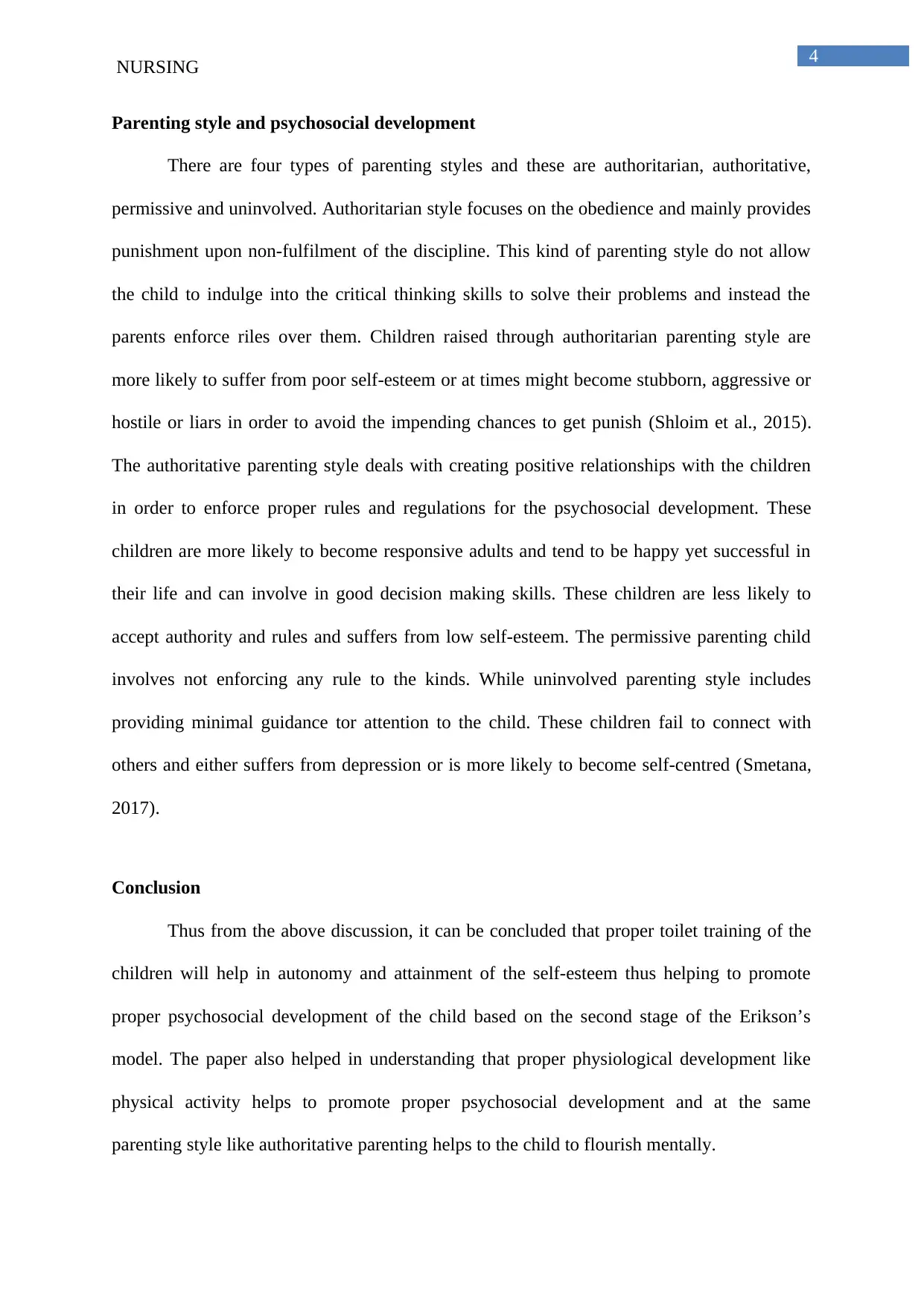
4
NURSING
Parenting style and psychosocial development
There are four types of parenting styles and these are authoritarian, authoritative,
permissive and uninvolved. Authoritarian style focuses on the obedience and mainly provides
punishment upon non-fulfilment of the discipline. This kind of parenting style do not allow
the child to indulge into the critical thinking skills to solve their problems and instead the
parents enforce riles over them. Children raised through authoritarian parenting style are
more likely to suffer from poor self-esteem or at times might become stubborn, aggressive or
hostile or liars in order to avoid the impending chances to get punish (Shloim et al., 2015).
The authoritative parenting style deals with creating positive relationships with the children
in order to enforce proper rules and regulations for the psychosocial development. These
children are more likely to become responsive adults and tend to be happy yet successful in
their life and can involve in good decision making skills. These children are less likely to
accept authority and rules and suffers from low self-esteem. The permissive parenting child
involves not enforcing any rule to the kinds. While uninvolved parenting style includes
providing minimal guidance tor attention to the child. These children fail to connect with
others and either suffers from depression or is more likely to become self-centred (Smetana,
2017).
Conclusion
Thus from the above discussion, it can be concluded that proper toilet training of the
children will help in autonomy and attainment of the self-esteem thus helping to promote
proper psychosocial development of the child based on the second stage of the Erikson’s
model. The paper also helped in understanding that proper physiological development like
physical activity helps to promote proper psychosocial development and at the same
parenting style like authoritative parenting helps to the child to flourish mentally.
NURSING
Parenting style and psychosocial development
There are four types of parenting styles and these are authoritarian, authoritative,
permissive and uninvolved. Authoritarian style focuses on the obedience and mainly provides
punishment upon non-fulfilment of the discipline. This kind of parenting style do not allow
the child to indulge into the critical thinking skills to solve their problems and instead the
parents enforce riles over them. Children raised through authoritarian parenting style are
more likely to suffer from poor self-esteem or at times might become stubborn, aggressive or
hostile or liars in order to avoid the impending chances to get punish (Shloim et al., 2015).
The authoritative parenting style deals with creating positive relationships with the children
in order to enforce proper rules and regulations for the psychosocial development. These
children are more likely to become responsive adults and tend to be happy yet successful in
their life and can involve in good decision making skills. These children are less likely to
accept authority and rules and suffers from low self-esteem. The permissive parenting child
involves not enforcing any rule to the kinds. While uninvolved parenting style includes
providing minimal guidance tor attention to the child. These children fail to connect with
others and either suffers from depression or is more likely to become self-centred (Smetana,
2017).
Conclusion
Thus from the above discussion, it can be concluded that proper toilet training of the
children will help in autonomy and attainment of the self-esteem thus helping to promote
proper psychosocial development of the child based on the second stage of the Erikson’s
model. The paper also helped in understanding that proper physiological development like
physical activity helps to promote proper psychosocial development and at the same
parenting style like authoritative parenting helps to the child to flourish mentally.
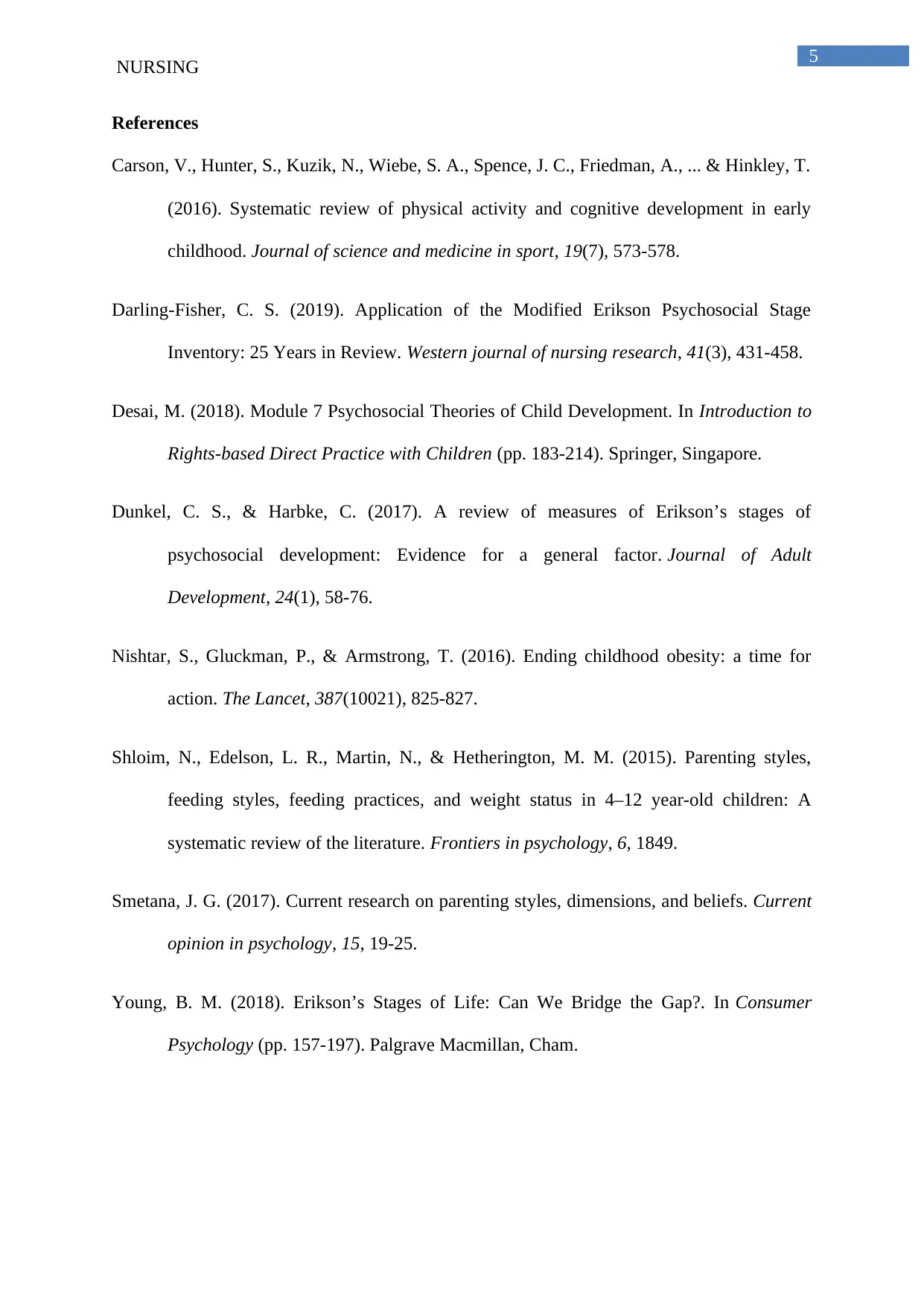
5
NURSING
References
Carson, V., Hunter, S., Kuzik, N., Wiebe, S. A., Spence, J. C., Friedman, A., ... & Hinkley, T.
(2016). Systematic review of physical activity and cognitive development in early
childhood. Journal of science and medicine in sport, 19(7), 573-578.
Darling-Fisher, C. S. (2019). Application of the Modified Erikson Psychosocial Stage
Inventory: 25 Years in Review. Western journal of nursing research, 41(3), 431-458.
Desai, M. (2018). Module 7 Psychosocial Theories of Child Development. In Introduction to
Rights-based Direct Practice with Children (pp. 183-214). Springer, Singapore.
Dunkel, C. S., & Harbke, C. (2017). A review of measures of Erikson’s stages of
psychosocial development: Evidence for a general factor. Journal of Adult
Development, 24(1), 58-76.
Nishtar, S., Gluckman, P., & Armstrong, T. (2016). Ending childhood obesity: a time for
action. The Lancet, 387(10021), 825-827.
Shloim, N., Edelson, L. R., Martin, N., & Hetherington, M. M. (2015). Parenting styles,
feeding styles, feeding practices, and weight status in 4–12 year-old children: A
systematic review of the literature. Frontiers in psychology, 6, 1849.
Smetana, J. G. (2017). Current research on parenting styles, dimensions, and beliefs. Current
opinion in psychology, 15, 19-25.
Young, B. M. (2018). Erikson’s Stages of Life: Can We Bridge the Gap?. In Consumer
Psychology (pp. 157-197). Palgrave Macmillan, Cham.
NURSING
References
Carson, V., Hunter, S., Kuzik, N., Wiebe, S. A., Spence, J. C., Friedman, A., ... & Hinkley, T.
(2016). Systematic review of physical activity and cognitive development in early
childhood. Journal of science and medicine in sport, 19(7), 573-578.
Darling-Fisher, C. S. (2019). Application of the Modified Erikson Psychosocial Stage
Inventory: 25 Years in Review. Western journal of nursing research, 41(3), 431-458.
Desai, M. (2018). Module 7 Psychosocial Theories of Child Development. In Introduction to
Rights-based Direct Practice with Children (pp. 183-214). Springer, Singapore.
Dunkel, C. S., & Harbke, C. (2017). A review of measures of Erikson’s stages of
psychosocial development: Evidence for a general factor. Journal of Adult
Development, 24(1), 58-76.
Nishtar, S., Gluckman, P., & Armstrong, T. (2016). Ending childhood obesity: a time for
action. The Lancet, 387(10021), 825-827.
Shloim, N., Edelson, L. R., Martin, N., & Hetherington, M. M. (2015). Parenting styles,
feeding styles, feeding practices, and weight status in 4–12 year-old children: A
systematic review of the literature. Frontiers in psychology, 6, 1849.
Smetana, J. G. (2017). Current research on parenting styles, dimensions, and beliefs. Current
opinion in psychology, 15, 19-25.
Young, B. M. (2018). Erikson’s Stages of Life: Can We Bridge the Gap?. In Consumer
Psychology (pp. 157-197). Palgrave Macmillan, Cham.
⊘ This is a preview!⊘
Do you want full access?
Subscribe today to unlock all pages.

Trusted by 1+ million students worldwide
1 out of 6
Related Documents
Your All-in-One AI-Powered Toolkit for Academic Success.
+13062052269
info@desklib.com
Available 24*7 on WhatsApp / Email
![[object Object]](/_next/static/media/star-bottom.7253800d.svg)
Unlock your academic potential
Copyright © 2020–2026 A2Z Services. All Rights Reserved. Developed and managed by ZUCOL.





